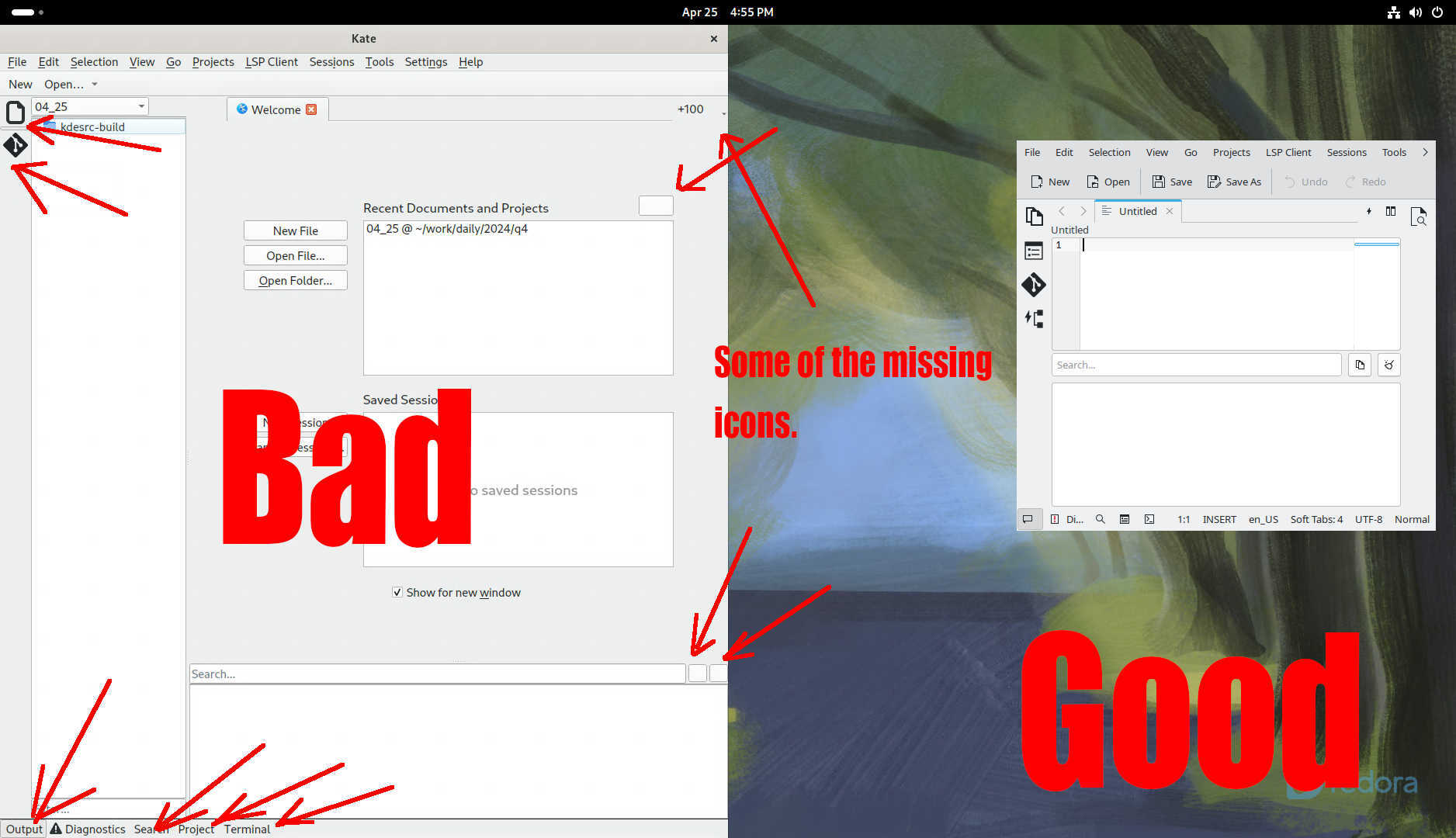- cross-posted to:
- [email protected]
- cross-posted to:
- [email protected]
Gnome breaking shit for no reason as always =P
Seriously, this is as simple as keeping symbolic links for compatibility, but they won’t do it because it maybe might possibly lead to issues.
As someone who much prefers gnome for my desktop this shit is so frustrating. I’m kinda just waiting and watching to see if they ruin another thing I like about it :(
Its fucking exhausting
deleted by creator
I can’t wait to throw it on my laptop. I hope the tiling is highly customizable because I need something I can throw on a laptop, not update in a while and still have it not break when I finally do.
I like Hyperland but it does break the config every once and a while.
Familiarity breeds contempt, give it some time and I’m sure cosmic will have its share of haters too. There’s hundreds of gnome devs, and all you’re seeing are clickbait blogposts like these made to stir up the pot. Go check out the discussions on discourse, matrix, or even gitlab to see what they’re actually like.
The problem isn’t that every gnome dev is bad - not by a long shot. The problem is that there are just enough gnome devs in just the right (wrong?) positions who have an “our way or the highway” philosophy that it causes problems not just for people trying to use GNOME, but for people (such as the Kate developers) who are trying to give their users a good experience.
And by being the default in so many distros, GNOME has enough clout that if they choose to abandon a standard, many people will change to whatever GNOME does, making their applications worse for people on other desktops.
In the end it’s not too dissimilar to the problems created by the dominance of Chromium and Windows. The biggest difference IMO is that Google are actually more conciliatory towards others than the GNOME team are in many cases. Which is kinda crazy given how much Google can throw their weight around on the web.
That’s because Cosmic is made by really cool people at System76 who actually care about their users/customers and the broader open source Linux desktop ecosystem
XFCE users looking around worriedly – can you please not mess with GTK? … please?
…
…
so … um, I’ve been hearing nice things about LXQT lately?
This is Libadwaita not GTK3
It’s GTK4, libadwaita is just their really weird theming stuff, but the UI toolkit is still called GTK, and version 4 of it forces you to use libadwaita. You can’t change the theme, because Gnome is actually user-hostile.
You can use a different theme with GTK 4 (not that you would want to)
Gnome to Gnome users: Why are they constantly shooting themselves in the foot?
Gnome to a Xfce (me) or KDE user: hey y’all come quick they’re doing something stupid again
Gnome devs to Gnome users: get gnomed you gnomes
Reading the bug report about all that ( https://gitlab.gnome.org/GNOME/adwaita-icon-theme/-/issues/288 ), it’s crazy to see how the gnome dev (Red Hat employee) replies to the issue. He completely ignores the issue in the beginning, then that he doesn’t care to follow the spec because it’s “old”, and yet, he still advertises to the OS as an fdo theme, so OSes ship with it. He’s hurting non-gnome apps, and he simply doesn’t seem to care about it. To me, this shows a person who simply doesn’t care about ecosystem.
I really love GNOME but the developers keep doing shit like this and I don’t get why. Their reasoning for why they won’t allow custom accent colors and only predefined ones was also stupid and then they just said that if people keep asking for custom colors, they won’t implement it at all.
I never really gave gnome a chance until I came across bluefin recently. I was pleasantly surprised but the lack of customizability always drives me away in the long run. Im not against opinionated design, their opinion on how things should be just seems to differ from my own.
More closed and non-customizable systems are much more stable. I guess that’s what GNOME devs are trying to achieve and I don’t really mind it. We have other options for those who need customization. The most used and mainstream one really should be focused on stability. Though I don’t think anyone tried breaking icons before. It’s a bit too much. The app devs will need to make multiple icons for different DEs which is a good thing but shouldn’t be forced like that
Don’t advertise the theme as standards compliant then.
Ahh, the old “it’s too difficult for us.”
If the gnome devs are so incompetent, why don’t they just get another job?
If stability was their aim, they wouldn’t be breaking stuff all the time…
I would argue that gnome is pretty stable in recent years. Don’t remember when was the last time something crashed.
This might would probably be true for Extensions.
KDE has been unstable for me on Wayland in the past.
The standards are supposed to be the stable thing. If some part of GNOME advertises itself as following a specific standard then it should remain stable in following that standard.
That is a misconception that 99% of the devs don’t understand. Sometimes you do need major changes that break stuff to upgrade the base. GNOME started doing it recently. Keeping old bases for a very long time makes them bloated, hacky, slow and unstable
Linus Torvalds is author and maintainer of one of the most successful pieces of software ever written ( software that is decades old and still growing in popularity ).
What does Linus says about your philosophy that “Sometimes you do need major changes that break stuff to upgrade the base”? I think his first sentence explains where he stands but he expands on his initial point.
Implementing old standards does not magically result in unstable software. I can create software today that implements decades old standards using whatever whiz-bang tech is in vogue.
I do lot accept that “old bases” have to succumb to any of the things you suggest either. Refactoring is a thing. You can remove dead code, you can adopt new patterns, you make code modular, you can even extend using new tech if you want.
Linux is 30 years old ( the basic design is decades older ). Should we throw it out? I vote no but allowing Rust into the kernel seems like a good idea. How old is GCC? How old is Microsoft Office? How old is Firefox? This is software you may use every day. Trust me, your life relies on software that is much, much older. How often do you think they rewrite air traffic control systems or core financial software to to make it more “stable” as you suggest?
I mostly hear your argument when devs want to try new tech and cannot justify it any other way. Most often the result is something that is far buggier and missing many features. By the time the features return, the new code is at least as bloated as the original. Around then, somebody usually suggests a total rewrite.
Old architectures are a different story. Sometimes things are not worth fixing in place. In my experience though, this is fairly rare. Even then, in-place migration to something else often makes more sense.
In my view, if you cannot modernize an old code base, it is a skills issue.
















